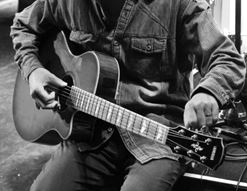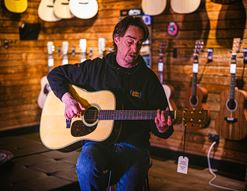When you listen to music, do you pay attention to the lyrics? Do you like hearing a narrative in your songs?
What if that narrative is based on a true story? Does that make the song better? That’s something I’ll be considering today as I put together this list of famous songs that are all based on true historical events.
Now, ‘based’ is the big word here. These aren’t paragraphs taken from history books, they are songs that used real events as inspirational jumping off points for the songwriter’s own creativity, so do factor that in as you peruse the songs and the stories today. Some of these are still pretty ‘fictional’, or take a more oblique approach to their subject matter. Others, I should say, are pretty directly describing the relevant events.
All of them are interesting though, and worth your time! So dig in with me, as I uncover traces of truth and real life within these great songs…
Songs Based on True Events, at a Glance
Smoke on the Water - Deep Purple
Cortez the Killer - Neil Young
Alexander the Great - Iron Maiden
Pride (In the Name of Love) - U2
Biko - Peter Gabriel
I’ll start with a song that goes for as direct a connection to events as possible. For such an arty musician (if all you know is Sledgehammer then there’s a whole world of discovery ahead of you), Gabriel chooses to pretty much spell out the murder of political activist Stephen Biko, at the hands of South African security police officers.
The song uses certain African drums in its arrangement, and the lyrics include phrases in Xhosa. There is a sense of outrage in the song simmering underneath, as Gabriel recounts the death of Biko. “When I try and sleep at night / I can only dream in red / The outside world is black and white / With only one colour dead”. Gabriel’s song was banned in South Africa back in 1980 when it was released, and is still played at his live shows to this day.
Smoke on the Water - Deep Purple
“Smoke on the water, Fire in the sky” It sounds like some sort of UFO encounter, but the reality is somewhat more prosaic, if no less dramatic.
Deep Purple were touring in Switzerland at the same time as Frank Zappa (1971). An excited Zappa audience member decided to fire a flare into the ceiling, causing a calamitous fire that caused the whole Montreaux Casino venue to burn down. Deep Purple were on the other side of Lake Geneva, watching it happen and feeling the inspiration arrive with the flames.
Desolation Row - Bob Dylan
Bob Dylan is obviously one of the greatest lyrics writers the world has known. His songs are often like ‘magical realism’ writings, where fantasy is blended into a realistically mundane reality. Dylan pulls in all sorts of figures from the Bible, from Shakespeare and from local life around him on the song Desolation Row.
However, the dark edge of that song is hinted at in the first line: “They’re selling postcards of the hanging”. This line - and others throughout the song - speak to events in Duluth, Minnesota, where three Black men from a travelling circus were hanged by a mob for the alleged rape of a white woman. The ‘selling’ postcards part describes the morally bereft landscape in which the protagonist finds themselves.
There’s a lot more happening inside this song’s lyrics that that event, but it’s an example of Dylan drawing from reality to add gravity and context to his imagination.
Cloudbusting - Kate Bush
This is based on the real life story of psychoanalyst Wilhelm Reich, his ideas about Orgone energy, and his eventual arrest and incarceration. Kate had come across Reich’s son’s memoir A Book of Dreams, and became fascinated with their story.
The song is sung from the son’s point of view, mentioning their farm/laboratory Orgonon, and the song’s title refers to Reich’s Cloudbusting machines. He maintained that he could change the weather using such devices, and Bush had one of the machines reimagined for the song’s video, in which she plays Reich’s son alongside Donald Sutherland’s Reich.
Orange Crush - R.E.M.
R.E.M.’s Michael Stipe has always been known for writing mysterious, expressive lyrics. That might be why this song’s meaning isn’t too immediately obvious. It’s an anti-Vietnam song, written in the late 80s when lots of American veterans were being forgotten and ignored by their government after serving in the war.
The song isn’t so directly about that, though. It’s more about the dangers of patriotism with lyrics like “we are agents of the free”, and “serve your conscience overseas”. There’s the title, which directly references Agent Orange, the chemical weapon used on civilians, and even the actual title itself, which speaks to America’s loss of innocence.
Sunday Bloody Sunday - U2
There’s no veiled references here in this famous U2 song. Bloody Sunday was an infamous massacre of Irish civilians by the British Army back in 1972. The events, which took place in Derry, Northern Ireland, saw 14 unarmed people killed (six of whom were aged 17) and nobody formally punished.
The members of U2 would’ve been between 10 and 12 years old when this happened, and a decade older when they wrote their incensed anthem.
The intro features a drum beat that is intentionally militaristic in tone, and according to drummer Larry Mullen Jr, has a meaning that is wider than the event itself: “That's an incident, the most famous incident in Northern Ireland and it's the strongest way of saying, 'How long? How long do we have to put up with this?' I don't care who's who – Catholics, Protestants, whatever. You know people are dying every single day through bitterness and hate, and we're saying why? What's the point?”
Cortez the Killer - Neil Young
Neil Young’s song about the Spanish conquest of Latin America uses impressionistic lines about life in places like ancient Tenochtitlan, and of the people who lived there. The song laments the loss of a beautiful and mysterious people - the ancient Maya and Mexica - and references their Great Speaker Montezuma, who made the mistake of trusting Cortez and his men.
The most potent lines are perhaps the first and last ones, both of which talk about the coming of the Spanish: “He came dancing across the water / With his galleons and guns / Looking for the new world / In the palace in the sun / He came dancing across the water / Cortez, Cortez / What a killer”.
Alexander the Great - Iron Maiden
Iron Maiden are great for historical epics. From Paschendale to The Parchment, The Clansman to The Pilgrim, Bruce and co definitely do their research. The greatest of all of these must be Alexander the Great, from 1986’s Somewhere in Time.
It’s a literal biography of the ancient Greek king, beginning with his birth and taking us right through to his mysterious death in Babylon. It even begins with a quote from Alexander’s father Philip, which is impressively nerdy of them. You wouldn’t think that such a rich and multifaceted life could be reduced to a few stanzas, but in this 8m35 epic, Iron Maiden pretty much manage it.
Pride (In the Name of Love) - U2
Our second look at a U2 song today, and this is another enduring classic that has become a live staple. Pride (In the Name of Love) speaks about the assassination of Martin Luther King, and the enduring weight behind his message of peace.
The song was a huge hit, and vocalist Bono has since told about the death threats he and the band received when they intended to play the song in Memphis, where the murder occurred. The band played the song anyway, showing the same spirit of freedom that Dr King died to support.
Three U2 songs in one blog might be pushing it, so let me just mention that New Years’ Day was written about the Polish Solidarity Movement, which played a crucial role in ending communist rule in Poland in the 1980s. The lyrics talk about the persecuted leader of the movement, Lech Walesa, who later went on to win the Nobel prize and became the Polish President.
Jeremy - Pearl Jam
Jeremy is an unusual song, any way you look at it. It has an odd riff, strangely impressionistic verse melodies and a small-ish chorus that says merely ‘Jeremy spoke in class today’. It was a huge hit for Pearl Jam regardless, and that was before people learned that the lyrics referred to Jeremy Wae Delle, a 15 year old boy from Texas who committed suicide in front of his classmates in school.
This is one of those situations where the artists have taken artistic licence with their references. According to those who knew Jeremy, the song is pretty inaccurate at portraying his real life. That aside, the song is a powerful take on bullying and neglect, and in fact draws from vocalist Eddie Vedder’s own school experiences with a troubled classmate, too.
Enola Gay - OMD
OMD’s famous anti-war songs Enola Gay is named after the aircraft which dropped the atomic bomb on Hiroshima. That’s relatively well known, I’d say, but the lyrics go a little deeper.
As well as condemning the act, there are clever references, such as the line “Is mother proud of Little Boy today?” On the surface, it’s perhaps asking about the mother of whomever pushed the button to drop the bomb. Looking closer. However, you’d learn that ‘Enolda Gay’ was the name of the pilot’s mother (the aircraft was named after her out of tradition) and that the bomb’s nickname was ‘Little Boy’. A further detail is revealed in the lyric “It’s 8.15 and that’s the time that it’s always been”. 8.15am was the moment the bomb detonated in Japan, and when watches in the Hiroshima area stopped working.
Nebraska - Bruce Springsteen
Nebraska was a departure for Springsteen. When it was released, he’d already given the world Born to Run, The River and Darkness on the Edge of Town. In other words, bombastic rock records with larger-than-life charisma. Nebraska was a sombre, quiet acoustic record, recorded on a Tascam Portastudio in Bruce’s living room with a cheap mic.
It has since been recognised as one of his greatest records, and not least for the storytelling that’s to be found within the songs. The title track is a point-of-view piece from the perspective of real life mass murderer Charles Starkweather, who went on a killing spree in Nebraska that ended the lives of 11 innocent people.
Prior to Springsteen’s album, Terence Mallick had made a movie on the subject - 1973’s Badlands - and this has clearly influenced Bruce’s writing as much as history.
It’s a Grim Old Life
Wow. When I started researching these true life songs, I didn’t quite appreciate how dark and morose so much of them are! I’m not sure what I expected, but it’s been a grim little journey, hasn’t it? I suppose it’s natural: it’s important for artists to both document such events and to try to reach at least some sort of understanding of them; or a position on them.
For many of us, it’s songs like these that teach us of the events. Some obscure people, such as Wilhelm Reich, may well have faded into obscurity within a few generations, had somebody not chosen to investigate their story and make art from it. By the same token, how many metalheads have gone and researched figures like Alexander the Great after hearing those songs?
There are many more songs out there that are based on true stories, but I’ve ran out of space today. Let me include just a few more as honorable mentions here at the end:
- Hurricane - Bob Dylan (boxer wrongly convicted of murder)
- Battle of New Orleans - Johnny Horton (Battle lost by the British in the US War of 1812)
- Jackie’s Strength - Tori Amos (Jackie Onassis, JFK’s widow)
- Flower of Scotland - The Corries (Robert the Bruce)
- Cities in Dust - Siouxsie and the Banshees (Pompeii destroyed by Vesuvius)
- I Don’t Like Mondays - Boomtown Rats (school shooting)
There are loads more, so let me know what I’ve missed and I’ll keep them in mind for the future. Thanks for reading, and whilst you’re here, why not check out these articles?
U2: How to Sound LIke The Edge
15 Guitars from your Favourite Films, TV & Videogames
15 Greatest Electronic Albums Ever





















